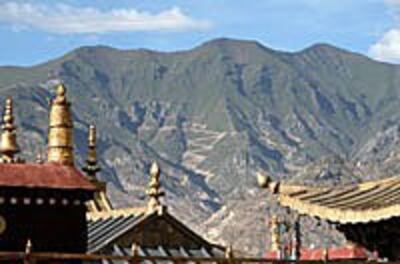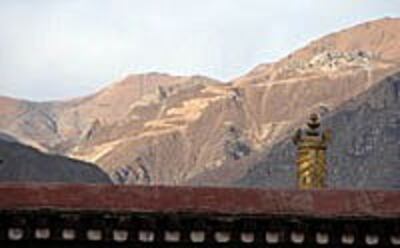
KATHMANDU—Authorities in the southwestern province of Sichuan have ordered an end to mining operations which 'do not help the local population' after hundreds of Tibetans blocked a road and staged a hunger strike over Chinese mining of a mountain that Tibetan Buddhists consider sacred.
The protest, in the Garthar area of Karze (Ganzi) prefecture, led to the detention of 22 Tibetans after the main Dartsedo (Kanding) to Karze road was blocked by protesters day and night, a source in Beijing told RFA's Tibetan service.
"On June 18, Sichuan provincial authorities instructed Karze officials to stop any mining activities which do not help the public," said the source, who said an emergency meeting of local government officials, Communist Party leaders and parliamentary representatives was held.
"They decided to release all the Tibetans and stop all mining activities which are not properly approved," the source added.
Most of the male residents...are hiding in the mountains for fear of Chinese reprisals,
Previously, the authorities had forbidden any Tibetans from going to Beijing to make a complaint; however one local resident had slipped through the net and succeeded in complaining to 'relevant departments,' the source said. The complaint resulted in a visit to the region by journalists of the official Xinhua news agency.
"Now everything is settled," the chief of police in Dawu (Daofu) county told RFA. "No Tibetan is under detention. The crisis is resolved. No local Tibetans were injured or hurt. Only officials were hurt since we were very tolerant," he said by telephone.
Mining activities at Shak Drak Lha Tse mountain [in Chinese, Nongge Shan] were suspended during the protests, which ended Tuesday, according to sources in the region who asked not to be named.
Mineral-rich area
The protesters staged relay hunger strikes outside the government offices in Dawu township (Daofu), Karze (Ganzi) prefecture, residents said. The hunger strikers stopped their protest on Tuesday after Jigme Namgyal Rinpoche, leader of Garthar monastery, stepped in and urged an end to their demonstration.

Tibetans who appealed to the provincial and central governments for an end to the mining, had been detained in Chengdu and Dawu, sources said.
"About a month back, on June 5, the Chinese miners found a huge piece of turquoise and the Chinese mining company organized a special event to celebrate," said another source.
"They invited many high-ranking officials of the district and the region. Taking this opportunity, the local Tibetans...launched a huge protest. They clashed with county and security officials and with members of the mining company, and it lasted several hours."
"Several vehicles belonging to the local government and the mining company were destroyed, and some 300 police from Dawu and Karze were sent in," the second source said.
Local Tibetans worship Shak Drak Lha Tse mountain, which they believe is home to a god that protects local lands, local sources say. "We always knew it was rich in minerals, but we never touched it because it was sacred," one local source said.
Chinese officials in the area, contacted ealier in the week by telephone, declined to comment.
"We, the county officials, are not supposed to give out any information about it. You should call the Public Security Bureau and not ask us," an official at the Dawu county government office said.
The Karze government sold the mountain to the Sichuan Nongge Shan Mining Co. Ltd., a joint venture between Huaye Resources Co. and Sichuan Yadi Dekuang Mountain Construction Co. Ltd. for 100 million yuan, of which 200,000 yuan went to local residents.
Appeals never heard
The mines found in the mountain are rich in mineral resources, locals say.
The initial clashes were reported to RFA by a caller from Dawu county, who said more than 1,000 Tibetans had clashed with the authorities after their appeal to government officials over the mine went unheard.
The area is home to a total of 400 to 500 Tibetan families. The protesters responded with stones and sticks and ransacked local buildings.
"The local Tibetans initially appealed to the authorities to stop the destruction of the sacred mountain," a Dawu resident said.
About 15 Tibetans set off for Beijing to make an official complaint, but they were detained before they left the area. Reports on Tuesday said at least 13 people had been released.
The main clashes took place on June 5 and soon escalated into a major riot, eyewitnesses said.
Protesters damaged government vehicles and set fire to motorcycles. Another team of 25 petitioners set off at that time for the provincial capital of Chengdu and were also detained.
China sees thousands of "mass incidents" across the country annually, as local land and resources are sold by local government officials keen to make huge profits. Local residents frequently complain they are not consulted and receive little or no compensation.
Original reporting by RFA's Tibetan service. Director: Jigme Ngapo. Translated by Karma Dorjee. Written for the Web in English by Luisetta Mudie. Edited by Sarah Jackson-Han.
